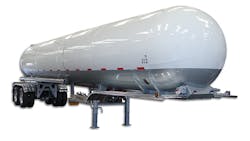PHMSA: 186 propane trailers must be reinspected
Nearly 200 MC-330 and MC-331 tank trailers manufactured in California and used to haul propane weren’t properly tested and inspected by a registered inspector and must be reinspected, according to a notice of enforcement policy posted Aug. 11 by the Pipeline and Hazardous Materials Safety Administration (PHMSA).
Companies using the improperly inspected tankers must have them reinspected by Nov. 10.
PHMSA and the Federal Motor Carrier Safety Administration (FMCSA) “will not take enforcement action against any person who transports U.S. DOT specification cargo tank motor vehicles (CTMVs) that are identified in this notice, and that have been tested and inspected by a person who was not qualified as a ‘Registered Inspector’” during the prescribed 90-day window for retesting, the agencies noted in the document.
The 186 trailers were uncovered during a recent FMCSA investigation at the Meeder Equipment Company/Ransome Manufacturing facility in Fresno, California, William S. Schoonover, PHMSA associate administrator, explained in the notice. The trailers were tested and inspected, but by a person who did not meet the qualifications of a registered inspector. The tests and inspections in question included internal visual inspections and pressure tests dating back to July 2018, and external visual inspections and leakage tests dating back to July 2022, as required by 49 CFR Parts 171-180 of the hazardous materials regulations (HMRs).
Any carrier in possession of a CTMV described in this notice should contact Meeder Equipment/Ransome to determine whether its CTMV is compliant with the HMR by emailing [email protected] or calling (559) 485-0979. The company is located at 3495 S. Maple Avenue in Fresno.
“Because the CTMVs described in this notice were inspected and tested by a person who did not meet the requirements of a ‘Registered Inspector,’ the CTMVs will require retesting and reinspection to ensure they are compliant and suitable for the safe transportation of hazardous materials,” PHMSA noted. “However, as no imminent safety vulnerabilities have been identified to date, PHMSA and FMCSA will not take enforcement action against any person who transports U.S. DOT specification CTMVs identified in this notice and have been tested and inspected by a person who was not qualified as a ‘Registered Inspector.’
“This relief applies only to transportation by motor vehicle [through Nov. 10], and does not extend to transport by air, vessel, or railroad.”
As defined in the HMRs, a registered inspector is someone who is registered with DOT in accordance with subpart F of part 107 and has the knowledge and ability to determine whether a cargo tank conforms to the applicable DOT specification. A registered inspector meets the knowledge and ability requirements in one of the following ways:
- Has an engineering degree and one year of work experience relating to the testing and inspection of cargo tanks
- Has an associate degree in engineering and two years of work experience relating to the testing and inspection of cargo tanks
- Has a high school diploma (or general equivalency diploma) and three years of work experience relating to the testing and inspection of cargo tanks
- Has at least three years’ experience performing the duties of a registered inspector prior to Sept. 1, 1991
Visit phmsa.dot.gov for more information.
